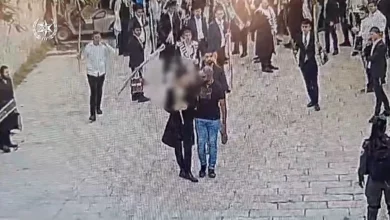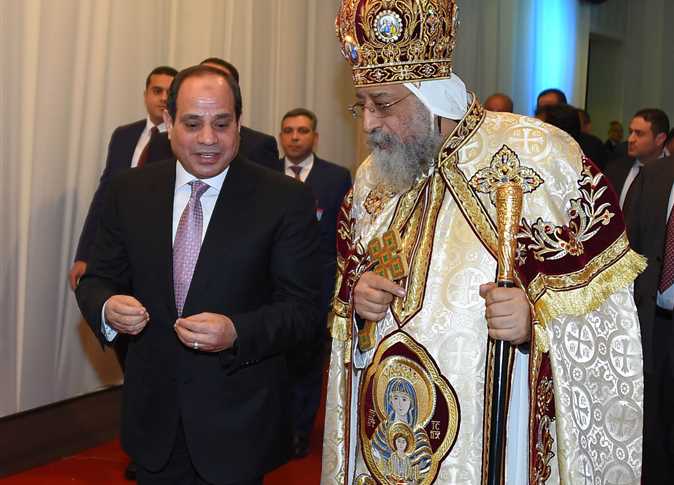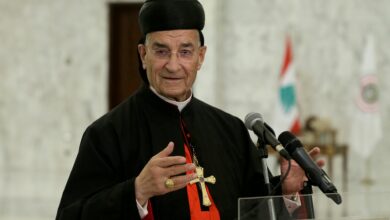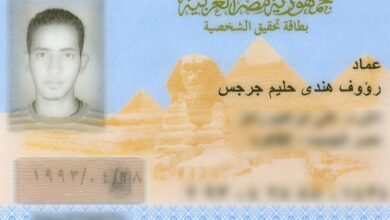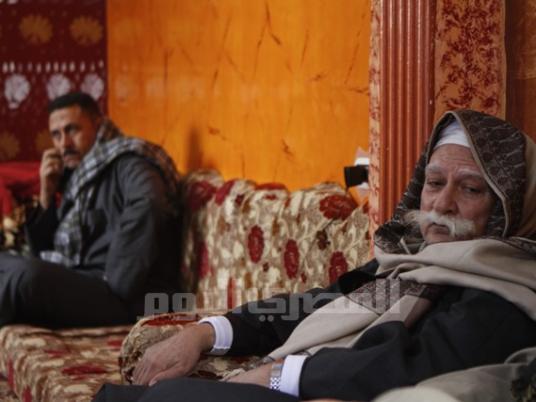
El-Nahda is a tough rural hinterland of lush green interspersed with the glowering, metallic silhouettes of industrial plants. The village of Sharbat is in El-Nahda, which itself is in the administrative department of Amreyya. Sharbat is a long drive down a partially unmade road from the nearby town called Amreyya. Local men in violet head wraps will cheerfully tell you that Sharbat is “just down the road” — words that ring in your head twenty minutes later when you are still driving and Sharbat has yet to appear.
Sharbat itself manages to be both sprawling and barren, and is particularly bleak on an Alexandrian winter day of low hanging clouds and spitting rain. On a main road is the burned-out shell of a three-story building, round the corner from another building whose façade has been painted a sooty black.
The buildings were attacked on 27 January, when a rumor spread in El-Nahda that Mourad Gerges, a Christian tailor, was involved in a sexual relationship with a married Muslim woman and had pictures of her on his mobile phone.
Gerges had by this time been taken into police custody, and remained in custody until the early hours of 16 February when he was released on bail. The circumstances of his detention, and what crime he was held for exactly, are unclear.
Enraged, residents of this socially conservative village gathered outside the Gerges home and demanded that the family leave. But the mob soon turned its attention to the property of another Christian family, that of Absakharon Khalil (popularly known as Abu Suleiman, “father of Suleiman,” the name of his oldest son), and it was this family that suffered the most damage.
The crowd that spoke to Egypt Independent on Tuesday expressed fervent respect for Abu Suleiman. His neighbor, Mohamed Moankash declared, “We all love him. Even the asphalt on the road behind you loves him.”
Moankash acknowledged that Abu Suleiman had nothing to do with the Mourad Gerges incident, saying that when Abu Suleiman heard about it he replied, “I’m an Upper Egyptian and he’s from [the Delta town of] Qom al-Hamash. Slaughter him; he has nothing to do with me.”
Mob rules?
Sayed Abdel-Wahed, a resident of Sharbat, said that the mob had been incensed when Abu Suleiman’s son Louis opened fire on them three times. Unable to get into the house, they looted the contents of the shops underneath before setting fire to them.
Abdel-Wahed alleges that more gunfire followed from a different property, this time from Adel, another of Abu Suleiman’s sons, further incensing the crowd.
Abu Suleiman and his sons remember things differently.
They recounted events from the living room of their neighbor Mohamed Galal, who has been housing them since 27 January in his home on the outskirts of the village.
Decades after leaving Sohag, Abu Suleiman still speaks with a broad Upper Egyptian accent. His son refers to him as “el mageddes,” the Upper Egyptian pronunciation of the Christian version of al-Hag, a title given to someone who has gone on the pilgrimage to Mecca (or in the Christian case, Jerusalem) and used as a sign of respect for older people.
Abu Suleiman’s oldest son described his version of the events that began on 27 January, his father occasionally mumbling interjections.
Suleiman Khalil recounts how, at the very beginning of the crisis the family had consulted the improbably named Essam Mussolini, a former National Democratic Party local councilor, for advice.
Mussolini told Abu Suleiman and his sons that “everything is under control and the boy [Gerges] is in police custody.” He nevertheless requested that they close their shops and told them that their property would be protected.
It wasn’t. Abu Suleiman and two of his sons watched from the roof of their building as it was attacked. Suleiman himself has a three-centimeter gash on his forehead from where he says he was struck by a rock.
Suleiman says that it was when the mob attempted to break in and “do to our women what Mourad did to the girl” that the family used the bird shot gun they keep in their home (the possession of which they say is common practice in rural homes) in an attempt to protect their family and disperse the crowd.
Three people in the crowd were injured by live ammunition fire during the events, one of them critically. While a few people in the crowd Egypt Independent spoke to suggested that the live ammunition was used by members of Abu Suleiman's family, this was explicitly denied by Sheikh Sherif El-Hawary, who said that a member of the mob fired the gun in response to the birdshot fire from Abu Suleiman's home.
Muslim neighbors eventually rescued Abu Suleiman, his sons and their families after local leaders intervened. The fire services were called to put out the flames, but on arrival the trucks and their crews were attacked by the mob.
Suleiman says that the family’s property, destroyed or damaged, is worth LE14 million. He says that LE80,000 was stolen from his house and LE130,000 from his brother’s.
The incident might have stopped there were it not for what happened next.
Traditional justice
A “committee” of local figures — Muslim and Christian religious leaders, Mussolini and others — gathered in what is known as a “reconciliation session” in an attempt to defuse and resolve the situation. They decided that eight Christian families, including Abu Suleiman and his relatives, would be made to leave the area.
These sessions are common practice in Upper Egypt, where state law is frequently superseded by tribal justice. But their use in sectarian crimes during the Mubarak years led to strong criticism. Critics say that these “customary law” solutions failed to hold perpetrators to account and created an atmosphere of impunity that encouraged more violence.
The use of a reconciliation committee, the involvement of Salafi figures and the decision it reached has proven particularly controversial as Egypt’s majority Freedom and Justice Party (the political wing of the Muslim Brotherhood) holds a majority in Parliament with the Salafi Nour Party in second position. There is growing speculation, and on occasion concern, about the possibility of the Islamic conservatism that is the ethos of these two parties translating into law, and what this might mean for Egypt’s religious minorities.
“In summary, the committee said, ‘We know you have nothing to do with what happened. We know that the only thing that connects you and Mourad is that you are both Christian, and we know you are well-respected in the area. We’re worried about you though because there is tension and there are people we can’t control. Your life is in danger.’ If my life is in danger why would I stay?” Suleiman said.
Galal suggests that the targeting of Abu Suleiman might be linked to an incident earlier this year. Abu Suleiman had donated a piece of land to a Christian community association. A building was constructed, and on the evening of 7 January, Coptic Christmas, a wedding was held.
“Some of the Muslim villagers suspected a church was going to be built on the land, and a crowd gathered. Since that time Abu Suleiman — who is considered the elder of El-Nahda’s Christian community — has been under some pressure,” Galal said.
It was decided by the committee that in addition to the eight families, all related to Mourad Gerges or Abu Suleiman leaving the village, their property would be sold at an auction.
“Seven people in the committee said that they speak in the name of the people in El-Nahda but the people who visit every day and express sympathy with us say that the committee has not taken their opinion on proceedings. None of them said they represent them or that they speak in their name,” Suleiman said.
When the idea was floated of letting Abu Suleiman return to the village, an angry mob burned down yet another of his properties. It was agreed that the committee would oversee the sale of Abu Suleiman’s property within a three-month period and that if the property were not sold, he would be able to return to it.
“A sheikh on the committee asked my forgiveness,” Suleiman says. “He told me that he wasn’t happy with the decision and that it wasn’t in accordance with Sharia but that it had to be made to avoid problems.”
The Sheikh
Sheikh Sherif El-Hawary spoke to Egypt Independent on three conditions: Firstly, that the interview take place in his office; secondly, that the female reporter wear “Islamic dress” and lastly, that an Arabic version of this article be published in Al-Masry Al-Youm, which, he says, has “misrepresented” him.
Hawary’s office is a small room in a mosque in the town of Amreyya. A crowd of people clamored at his office door, requesting permission from his two burly assistants to speak with the sheikh.
Hawary said that he and his assistants start their day at 10 am and listen to people’s problems until the evening prayers. He said that he got involved in events when Abu Suleiman appealed to him, saying that the decision reached by the committee was unjust. Hawary tore up the agreement and organized a new committee session.
“We told them that the Sharia demands that we protect Christian property, well-being, honor, and even churches. We told them, ‘We reject attacks on you and condemn the destruction that took place,’” Hawary told Egypt Independent.
Hawary said he told Abu Suleiman to stay in his house and offered to send “his Salafi brothers” to protect him and his family, as well as notifying the authorities and other residents that Abu Suleiman had the right to stay.
Suleiman Khalil corroborated this and thanked Hawary for the role he has played in the incident. He refused this offer however, because he wasn’t happy about putting someone trying to protect him in harm’s way, “in front of the cannon.”
Instead, Hawary said, Abu Suleiman agreed that Hawary would oversee the sale of his property.
“He agreed to this willingly, without any pressure,” Hawary said, adding that the family would receive financial compensation for damaged property.
The sheikh seemed genuinely frustrated at the reaction to the Amreyya case, alleging that it has blown it out of proportion by the media, and strenuously denied that it was in any way sectarian.
“It was the Christians on the committee who said that Mourad Gerges must leave. Abu Suleiman agreed, willingly, to leave. Forcing someone to leave is not in conflict with Sharia or customary law. Even if we had decided that Abu Suleiman should leave that’s a well-known custom — it’s not targeting Christians because they’re Christians.”
Why though, has the Muslim girl at the center of the relationship that sparked the problems also not been made to leave?
“This is a problem we will consider later for certain reasons concerning her family,” Hawary said.
Hawary said that “more than 10 Christians” had come to his office on the day Egypt Independent interviewed him seeking resolutions to their problems.
He emphasized the demographic makeup of the area, with its Bedouins and Upper Egyptians and the traditions both bring with them, and said that even crimes as serious as murder could be dealt with in these informal sessions —recently he had overseen a resolution to a case involving two deaths.
His words echoed a comment made by Abdel-Wahed in Sharbat: “Here, customary law is stronger than [state] law”.
Hawary sees no conflict between these reconciliation sessions and the application of state law, saying, “The boy is in the public prosecution office and the law is taking its course. But who will put out the fire that’s raging [in the village]?”
Rights groups, however, say that the law does not allow customary reconciliation in arson cases.
Suleiman Khalil agrees.
While informal reconciliation sessions are appropriate for some issues, he says, “They are not for the level this problem has reached.”
“The government should decide whether or not I can stay here. Where is the country that is supposed to protect me — or am I not an Egyptian citizen with rights? What crime have I committed that I should be dealt with like this?”

